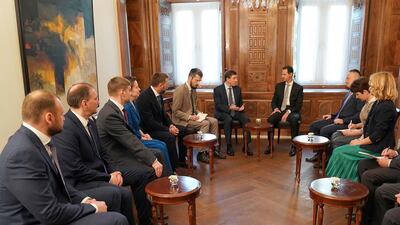The United States cooled expectations of an early pull out of 2,000 troops from Syria saying they would remain until key strategic goals were secured.
Nikki Haley, the US ambassador to the United Nations, said troops would not be removed until ISIS was defeated, chemical weapons no longer threatened US interests and it could ensure the monitoring of Iranian activity.
It is our goal “to see American troops come home, but we are not going to leave until we know we have accomplished those things”, she told the Fox network.
President Trump surprised members of his administration last month when he publicly expressed his determination to remove US forces from Syria.
He repeated his claims before the chemical weapons attack on the former rebel-held town of Douma on April 7 that sparked the reprisal attacks by the US, France and Britain. He told reporters then that “sometimes it's time to come back home and we're thinking about that very seriously”.
Ms Haley’s latest comments came after contradictions appeared within the US position on Syria. She reported Mr Trump telling her on Saturday that the US was “locked and loaded” and prepared for a sustained military effort against Syria, while his Secretary of Defense Jim Mattis said it was a ‘one-time’ shot.
A bullish Bashar Al Assad was in a good mood when he met a group of visiting Russian lawmakers after the attacks were more limited than predicted following Mr Trump’s initially aggressive response to the Douma attack.
He told the visiting delegation that the Western airstrikes against his country were accompanied by a campaign of "lies and misinformation” in the UN Security Council, according to comments carried by state media.
_______________
Read more:
Labour's Corbyn calls Syrian strikes 'legally questionable'
Trump declares strikes a success in Syria
_______________
Action to tackle the seven-year war and the use of chemical weapons has been stymied at the United Nations because of the veto-power wielded by Syria ally, Russia.
Mr Assad said that he believed that the airstrikes would unify the country, according to Dmitry Sablin who was one of his visitors. His comments came as the regime regained full control of Douma and deployed thousands more security forces there following a surrender deal with the rebels after a months-long government offensive that left hundreds dead.
European leaders sought to capitalise on the attention on Syria Sunday with attempts to co-opt Russia into a fresh diplomatic push to end seven years of fighting. German President Frank-Walter Steinmeier warned against demonising Russia and said the air strikes raised the risk of a direct confrontation between US and Russian forces in Syria for the first time.
Germany, which relies on Russia for about a third of its gas, has long taken a careful line with Moscow.
“The galloping alienation between Russia and the West must also concern us, with consequences that will go far beyond this case. There is practically no basis of trust any more,” he told the Bild am Sonntag newspaper.
French leader Emmanuel Macron and his foreign minister Jean-Yves Le Drian also both reached out to Russia calling for “joint efforts” to work their way out of the crisis.
Meanwhile in Britain, opposition lawmakers were set to confront premier Theresa May in parliament on Monday over the lack of a parliamentary vote before joining the US and France in launching airstrikes.
Opposition leader Jeremy Corbyn, who has opposed British military action throughout his career, described the Syrian attack as “legally questionable.”
He called for a new law to stop governments launching military action in most circumstances without the backing of MPs. The prime minister “should have sought parliamentary approval, not trailed after Donald Trump,” he said.

